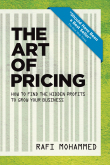Why Rebates Encourage Tax Evasion
Reprinted from the Harvard Business Review website.
Last weekend I stopped by my local Staples office supply store to take advantage of a fantastic deal. They were offering 500-sheet reams of paper for $6.99, with a $5.99 rebate, leaving a net price of $1. Applying for my rebate could not have been easier: I simply inputted a series of numbers listed on my receipt on the Staples web site, and chose to have the money deposited in my PayPal account.
This experience got me wondering: Why are rebates used, and more importantly, why aren't other retailers focused on rebates as vigorously as Staples seems to be?
Rebates are typically used as a form of differential pricing, the strategy of charging different prices to different customers. An eye-catchy discounted price can be advertised in bold print accompanied by a small print "after rebate" asterisk. Those who invest the time and energy to apply, wait, and cash a rebate check are jumping a "hurdle" designed to identify price sensitive customers. Consumers less concerned about price choose to skip this tedious process. For the record, I count "forgetting" to apply for a rebate as a choice ‘ it's a signal that price is not of high importance. The end-result is customers pay different prices for the same product. This strategy is good for sellers because instead of providing a margin crushing across-the-board discount, only those who care about price ‘ as evidenced by jumping over the hurdle ‘ receive them.
A general rule of thumb is 50% of those eligible for a rebate don't actually pursue it. For instance, TiVo, the DVR (digital video recorder) entertainment company once offered a $100 rebate. Given the significant amount of this rebate, TiVo was surprised that 50,000 out of the eligible 104,000 customers failed to make a claim.
In addition to reaping a discount, there are other reasons why buyers may prefer rebates: tax evasion and fraud. I now have a receipt confirming that I paid $6.99 for a ream of paper. Instead of my true cost of $1, I could very easily deduct $6.99 as a business expense on my company's tax filings. (Note: I could, but I won't.) To be clear, retailers do not advocate rebates be used to dodge taxes or commit fraud (nor do I). But my hunch is that retailers understand that this is just one more reason some consumers find rebates really attractive to an important buying segment for retailers that sell everyday products: small business customers.
Admittedly, a few dollars here and there isn't a lot of money. But that's not my point. Retailers selling commodity-like products such as office supplies in highly competitive markets are seeking any edge to develop a long-term purchasing relationship with customers. If offering rebates makes a retailer top of mind for small business customers, a more aggressive use of this pricing strategy seems sensible.
A key takeaway for all businesses is that different customer segments have different pricing needs. The key to pricing for profit and growth is to offer a variety of pricing that strategies that meet the needs, thus "activate," as many segments as possible.
So what do you think? Do you always claim rebates? Do you think small businesses report their true costs, net of refunds, to the IRS? Should all businesses selling commodity-like products to small businesses use rebates?




